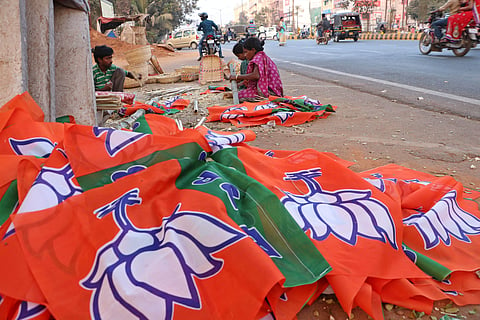

NEW DELHI: The BJP and the JD-U -- the two major constituents of the Bihar's ruling NDA -- are trying a new social engineering in the Lok Sabha polls in view of the complex caste matrix of the state, with the saffron party banking largely on upper castes and its ally focussing heavily on OBCs and EBCs.
This social engineering will be an acid test for the National Democratic Alliance (NDA) in all the 40 parliamentary constituencies against the "Mahagathbandhan" (Grand Alliance) of the Rashtriya Janata Dal (RJD), Congress, Hindustani Awam Morcha (HAM) and the Rashtriya Lok Samata Party (RLSP).
The Bharatiya Janata Party (BJP) has mostly named candidates from the upper castes (11), considered the party's traditional support base. Among the 11 upper caste candidates, the party has fielded five Rajputs, two each from Brahmin and Vaishya communities and one each from Bhumihar and Kayastha.
It has also fielded three candidates from the Other Backward Classes (OBCs), two from Extremely Backward Castes (EBCs) and one from the Scheduled Castes (SCs) keeping in mind the winnability factor.
In contrast, the Janata Dal-United (JD-U) is banking heavily on the OBCs and the EBCs, who constitute nearly 50 per cent of the state's population, and the SCs, who form 15.7 per cent of the populace, and the Muslims.
Although every part of Bihar has its own special significance in the state politics because of its demographic features, Muslims and Yadavs (OBCs), who constitute nearly 32 per cent of Bihar's population, are considered loyal to Lalu Prasad-led RJD.
Overall, the NDA's list has 13 upper castes, nine from OBCs, eight from EBCs and three tickets have gone to SCs. Only one Muslim has been given ticket by the JD-U.
Political analysts say that the NDA has adjusted every section of society in the ticket distribution and has the capability to demolish the caste matrix of the Grand Alliance.
The BJP is confident of the overwhelming support of its traditional support base -- the upper castes, along with JD-Us' non-Yadav OBCs like Kurmi and EBCs.
"BJP and JD-U are also banking heavily upon the EBCs, who constitute nearly 30 per cent of the state's population, and the SCs, who constitute 15.7 per cent," said an NDA leader.
The NDA leaders maintain that the coalition is banking on Prime Minister Narendra Modi's charisma, Chief Minister Nitish Kumar's image of a "development man" and the social engineering of the allies.
Among Rajputs, the NDA has fielded Radha Mohan Singh (Motihari), R.K. Singh (Ara), Rajiv Pratap Rudy (Saran), Janardan Singh Sigriwal (Maharajganj) and Sushil Kumar Singh (Aurangabad) -- all from the BJP.
Besides, three candidates -- Giriraj Singh (BJP-Begusarai), Rajiv Ranjan Singh alias Lalan (JD-U-Munger) and Chandan Kumar (LJP-Nawada) -- belong to the Bhumihar community, believed to be the most vocal and assertive among all the upper caste groups in Bihar.
Two Brahmins from the BJP, Ashwini Kumar Choubey (Buxar) and Gopalji Thakur (Darbhanga), have also found a place in the list.
Union Minister Ravi Shankar Prasad, a Kayastha, has been fielded from Patna Sahib, which has a sizeable population of the community. He faces the challenge of retaining the seat for the BJP in a straight contest with second-term MP Shatrughan Sinha, who is likely to be fielded this time by the Congress.
According to the agreement, the JD-U and the BJP will contest 17 seats each and the LJP the rest six.
The BJP is contesting West Champaran, East Champaran, Sheohar, Madhubani, Araria, Darbhanga, Muzaffarpur, Maharajganj, Saran, Ujiyarpur, Begusarai, Sasaram, Aurangabad, Buxar, Ara, Patna Saheb and Patliputra constituencies.
The JD-U is contesting Valmikinagar, Sitamarhi, Jhanjharpur, Supaul, Kishanganj, Katihar, Purnea, Madhepura, Bhagalpur, Gopalganj, Banka, Munger, Nalanda, Gaya, Jehanabad, Siwan and Karakat parliamentary seats.
The LJP will be contesting the Vaishali, Hajipur, Jamui, Khagaria, Samastipur and Nawada seats. The BJP has ceded five seats to the JD-U -- Valmikinagar, Gaya, Siwan, Gopalganj and Jhanjharpur -- that it won in 2014.
The NDA had won 31 of the 40 seats in the state in 2014. Of this, the BJP won 22 seats, LJP 6 and the Upendra Kushwaha-led Rashtriya Lok Samta Party (RLSP) 3. The RLSP has joined the opposition Grand Alliance this time.
The JD-U, not part of the NDA then, had contested the 2014 elections on its own and won only two seats -- Purnea and Nawada. The NDA leaders, while issuing the list have taken care that all segments of the society get due representation.
Bihar, which has 40 parliamentary seats, polled for four seats in the first phase on Thursday, and voting for the remaining seats will take place in the next six phases.